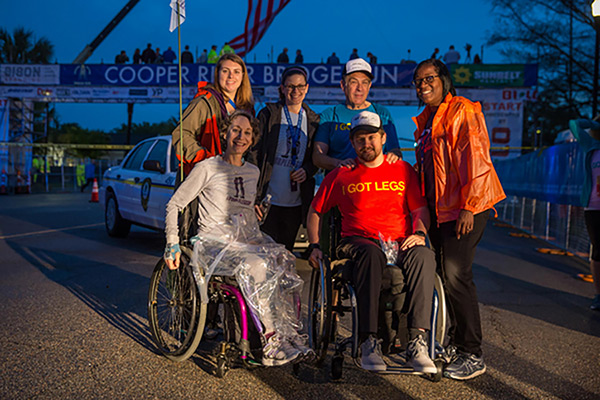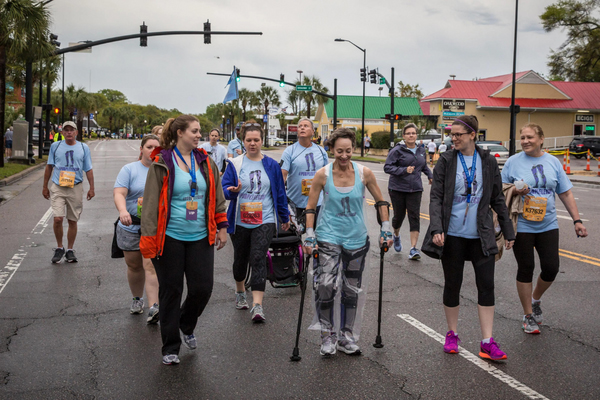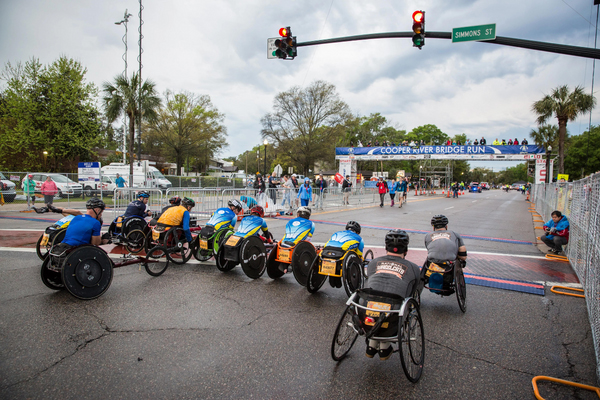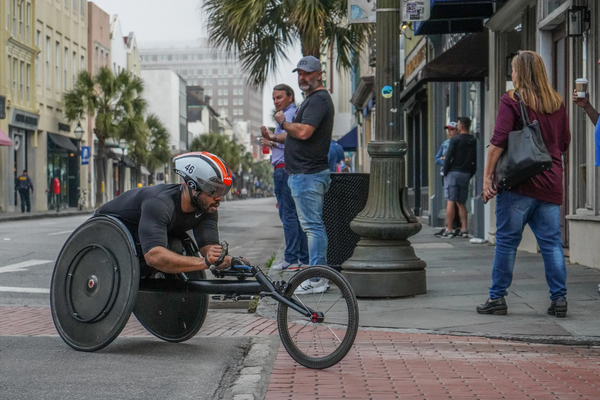Tuesday, March 28, 2023
-
For the love of rehab

Physical Therapist and Neurologic Clinical Specialist Kyle Cooper is looking forward to rising hours before sunrise on the day of the Cooper River Bridge Run (CRBR).
But unlike the thousands of others who wake up to participate, Cooper is among a much smaller group – one of only a few dozen volunteers who support elite wheelchair racers.
“It’s everything that’s important to me,” Cooper said. “It’s my bread and butter. It’s my passion.”
Cooper’s passion
Cooper’s expertise falls under the neurologic specialty umbrella, meaning she works with patients who have conditions ranging from brain and spinal cord injuries to stroke and other neurological diseases. She loves playing a role in giving someone back what they thought they couldn’t have anymore, she said.
“Maybe a patient might still have some physical limitations, but we can give them back their independence,” Cooper said. “The greatest joy of this work for me is giving something back. It’s what puts a smile on my face.”
The volunteers’ roles
Roper St. Francis Healthcare has been sponsoring the CRBR wheelchair division for years and Roper Rehabilitation Hospital and Roper St. Francis Healthcare Rehabilitation Services teammates are integral volunteers. This year, sixteen Roper St. Francis teammates are expected to volunteer specifically with the wheelchair division. Their role is critical in facilitating the event. Volunteers greet the racers at their hotel first thing in the morning, help pack up their gear, load them on the buses and get them to the finish line.
Cooper remembers the first time she volunteered as a new grad and quickly learning a valuable lesson when she approached one of the racers to help transfer him from his track chair to his everyday chair.
“He basically told me no,” Cooper said. “It was a strong realization on my part that these racers are athletes participating in a high-level event. It taught me what people are truly capable of and not to underestimate them.”
Once the race begins, volunteers are available for support as needed.
The volunteers who are part of the bicycle crew ride alongside the wheelchair racers to alert the team should anything go awry. Additionally, a team of volunteers follow behind in the Support and Gear (SAG) wagon, an accessible bus, in case the athletes need to be picked up for any reason.
The wheelchair race takes place before the CRBR Elite Runners portion of the event, and the event runs on the same course so it’s a tight schedule. Wheelchair participants must cross the finish line within 45 minutes. If racers are not at the midpoint within 20-25 minutes, they are picked up and taken to the finish line.
At the finish line, volunteers further assist by having the racers’ everyday chairs so they can quickly transfer themselves out of their track chairs, which can become uncomfortable after a long period of time. Volunteers also assist athletes with post-race stretches, as needed.
“These athletes have put in the hard work to compete,” Cooper said. “We’re just there to help facilitate their ability.”
Harnessing inspiration
Like Cooper, many volunteers are physical therapists. Cooper noted that their experience makes them more in tune with the racers. They look for signs of secondary conditions related to spinal cord injuries and neuro diagnoses such as blood pressure or skin issues. They’re also able to advocate for the racers’ specific needs more than someone who doesn’t have the same training.
“I get more insight every time I work with athletes in this capacity,” said Cooper, who’s volunteered with the race since starting at Roper Hospital 12 years ago. “I see what they’re capable of and learn more about what we, as therapists, can do to better our patients’ lives.”
Working with experienced athletes who have overcome adversity to perform at such high ability levels motivates Cooper and fuels her love of rehab.
“To know where someone might have come from and what they went through to get there, it’s inspiring to see that,” Cooper said. “That inspiration drives us to do our best in helping our own patients overcome similar situations.”
In 2016, Cooper worked closely with a patient, Marka Danielle Rodgers, who became the first incomplete quadriplegic to complete the Cooper River Bridge Run. Read Rodgers’ story here.
For Cooper, Roper St. Francis Healthcare’s sponsorship of the CRBR wheelchair division feels like a declaration of its commitment to compassionate, holistic care that extends beyond hospital walls.
“Roper St. Francis Healthcare has always strived to be a community support,” Cooper said. “And this sponsorship helps demonstrate that people of all abilities can participate in a race like this.”
Cooper hopes that Roper St. Francis Healthcare will continue to raise awareness through its involvement in events and sponsorships such as the CRBR’s wheelchair race.
“How do we, as an organization, inspire more recreation for people with disabilities?” Cooper asked. “I would love to see us overcome that challenge and provide even more comprehensive opportunities for recreation that helps our patients thrive.”


